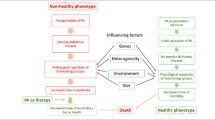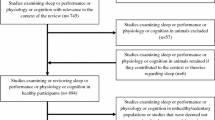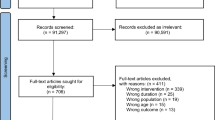Abstract
The influences of exercise on cytokine response, health-related quality of life (HR-QoL), and fatigue are important aspects of MS rehabilitation. Physical exercises performed within these programs are often practiced in water, but the effects of immersion have not been investigated. To investigate the influences of short-term immune responses and cardiorespiratory fitness on HR-QoL and fatigue during 3 weeks endurance training conducted on a cycle-ergometer or an aquatic-bike. Randomized controlled clinical trial in 60 MS patients. HR-QoL, fatigue, cardiorespiratory fitness, and short-term immune changes (serum concentrations in response to cardiopulmonary exercise test) of brain-derived neurotrophic factor (BDNF), nerve growth factor (NGF), interleukin-6, and the soluble receptor of IL-6 (sIL-6R) were determined at the beginning and end of 3 weeks of training intervention. Subjects performed daily 30 min training at 60 % of their VO2peak. SF-36 total (p = 0.031), physical (p = 0.004), and mental health (p = 0.057) scores show time effects within both groups. Between-group effects were shown for FSMC total (p = 0.040) and motor function score (p = 0.041). MFIS physical fatigue showed time effects (p = 0.008) for both groups. Linear regression models showed relationships between short-term immune responses and cardiorespiratory fitness with HR-QoL and fatigue after the intervention. This study indicates beneficial effects of endurance training independent of the training setting. Short-term immune adaptations and cardiorespiratory fitness have the potential to influence HR-QoL and fatigue in persons with MS. The specific immune responses of immersion to exercise need further clarification.



Similar content being viewed by others
References
Brück W (2005) Inflammatory demyelination is not central to the pathogenesis of multiple sclerosis. J Neurol 252(5):10–15
Kent-Braun JANGAV, Castro M, Werner MW, Gelinas D, Dudedley GA et al (1997) Strength skeletal muscle composition and enzyme activity in multiple sclerosis. J Appl Phsiol 83:1998–2004
Miller A, Dishon S (2006) Health-related quality of life in multiple sclerosis: the impact of disability, gender and employment status. Qual Life Res 15:259–271
Lucchinetti C, Brück W, Parisi J, Scheithauer B, Rodriguez M, Lassmann H (2000) Heterogeneity of multiple sclerosis lesions: implications for the pathogenesis of demyelination. Ann Neurol 47:707–717
Kohut M, McCann D, Russell D, Konopka D, Cunnick J, Franke W et al (2006) Aerobic exercise, but not flexibility/resistance exercise, reduces serum IL-18, CRP, and IL-6independent of [beta]-blockers, BMI, and psychosocial factors in older adults. Brain Behav Immun 20:201–209
Rojas S, Knicker A, Hollmann W, Bloch W, Strüder K (2010) Effect of resistance exercise on serum levels of growth factors in humans. Horm Metab Res 42:982–986
Castellano V, White L (2008) Serum brain-derived neurotrophic factor response to aerobic exercise in multiple sclerosis. J Neurol Sci 269:85–91
Prakash RS, Snook EM, Motl RW, Kramer A (2010) Aerobic fitness is associated with gray matter volume and white matter integrity in multiple sclerosis. Brain Res 1341:41–51
Kamioka H, Tsutani K, Okuizumi H, Mutoh Y, Ohta M, Handa S et al (2010) Effectiveness of aquatic exercise and balneotherapy: a summary of systematic reviews based on randomized controlled trials of water immersion therapies. J Epidemiol 20(1):2–12
Krishna G, Danovitch GM, Sowers JR (1983) Catecholamine responses to central volume expansion produced by head-out water immersion and saline infusion. J Clin Endocrinol Metab 56:998–1002
Grossman E, Goldstein DS, Hoffman A, Wacks IR, Epstein M (1992) Effects of water immersion on sympathoadrenal and dopa-dopamine systems in humans. Am J Physiol 262(6):2
Kargarfard M, Etemadifar M, Baker P, Mehrabi M, Hayatbakhsh R (2012) Effect of aquatic exercise training on fatigue and health-related quality of life in patients with multiple sclerosis. Arch Phys Med Rehab 93(10):1701–1708
Roehrs TG, Karst GM (2004) Effects of an aquatics exercise program on quality of life measures for individuals with progressive multiple sclerosis. J Neurol Phys Ther 28(2):63–71
Gehlsen GM, Grigsby SA, Winant DM (1984) Effects of an aquatic fitness program on the muscle strength and endurance of patients with multiple sclerosis. Phys Ther 31:653–657
Bansi J, Bloch W, Gamper U, Kesselring J (2013) Training in MS: influence of two different training protocols (aquatic versus overland) on cytokine and neurotrophin concentrations during three-week randomized controlled trial. Mult Scler 19(5):613–621
Polman CH, Reingold SC, Ednan G, Filippi M, Hartung HP, Kappos L et al (2005) Diagnostic criteria for multiple sclerosis: 2005 revisions to the “McDonald criteria”. Ann Neurol 58(6):840–846
Penner IK, Raseli C, Stocklin M, Opwis K, Kappos L, Calabrese P (2009) The fatigue scale for motor and cognitive functions (FSMC): validation of a new instrument to assess multiple sclerosis-related fatigue. Mult Scler 15:1509–1517
Wassermann K, Hansen JE, Sue DY, Stringer WW, Whipp BJ (2005) Principles of exercise testing and prescription, 4th edn. Lippincott Williams & Wilkins, Philadelphia
Wilcock IM, Cronin JB, Hing WA (2006) Physiological response to water immersion: a method for sport recovery? Sports Med 36:747–765
Park KS, Choi JK, Park YS (1999) Cardiovascular regulation during water immersion. Appl Human Sci 18:233–241
Schnitzer W, Fenzl M, Knüsel O, Hartmann B (2006) Concerning a question about the correction of the training heart rate in the water. Significance of the water temperature? Phys Med Rehab Kuror 16:330–336
Morfeld M, Bullinger M, Nantke J, Brähler E (2005) The version 2.0 of the SF-36 health survey: results of a population-representative study. Soz Präv Med 5:292–300
Tellez M, Rio J, Tintore M et al (2005) Does the Modified Fatigue Impact Scale offer a more comprehensive assessment of fatigue in MS? Mult Scler 11:198–202
Vignali DA (2000) Multiplexed particle-based flow cytometric assays. J Immunol Methods 243:243–255
Motl RW, Gosney JL (2008) Effect of exercise training on quality of life in multiple sclerosis. A meta-analysis. Mult Scler 14:129–135
Mostert S, Kesselring J (2002) Effects of a short-term exercise training program on aerobic fitness, fatigue, health perception and activity level of subjects with multiple sclerosis. Mult Scler 8:161–168
Surraka J, Romberg A, Ruutiainen J, Aunola S, Virtanen A, Karppi SL et al (2004) Effects of aerobic and strength exercise on motor fatigue in men and women with multiple sclerosis: a randomized controlled trial. Clin Rehabil 18:737–746
Dalgas U, Stenager E, Jacobson J, Petersen T, Hansen HJ, Knudsen C et al (2010) Fatigue, mood and quality of life improve in MS patients after progressive resistance training. Mult Scler 16:480–490
Rasova K, Havrdova E, Brandejsky P, Zalisova M, Foubikova B, Martinkova P (2006) Comparison of the influence of different rehabilitaions programmes on clinical, spirometric and spiroergometric parameters in patients with multiple sclerosis. Mult Scler 12:227–234
Cakt BD, Nacir B, Genc H, Sracoglu M, Karagoz A, Erdem HR et al (2010) Cycling and progressive resistance training for people with multiple sclerosis: a randomized controlled study. Am J Phys Med Rehabil 89:446–457
Romberg A, Virtanen A, Ruutiainen J et al (2004) Effects of a 6-month exercise program on patients with multiple sclerosis: a randomized study. Neurology 63:2034–2038
Andreasen AK, Stanager E, Dalgas U (2011) The effect of exercise on fatigue in multiple sclerosis. Mult Scler 17:1041–1054
Gold SM, Schulz KH, Hartmann S, Mladek M, Land UE, Hellweg R et al (2003) Basal serum levels reactivity of nerve growth factor and brain-derived neurotrophic factor to standardized exercise in multiple sclerosis and controls. J Neurol Sci 138:99–105
Schulz KH, Gold SM, Witte J, Bartsch K, Lang UE, Hellweg R et al (2004) Impact of aerobic training on immune-endocrine parameters, neurotrophic factors, quality of life and coordinative function in multiple sclerosis. J Neurol Sci 225:11–18
Pedersen AM, Petersen BK (2005) The anti-inflammatory effects of exercise. J Appl Phys 98:1154–1162
Acknowledgments
This research was supported by Biogen-Dompe (nr. BD_09_212), CH- 6300, Switzerland. The laboratory tests were analyzed through the excellent expertise of A. Urwyler, cytolab, Switzerland. The authors wish to thank Nemcomed©, Germany, for lending the Rehabilitation Center Valens two aqua bikes over the training intervention.
Conflicts of interest
On behalf of all authors, the corresponding author states that there are no conflicts of interest.
Author information
Authors and Affiliations
Corresponding author
Rights and permissions
About this article
Cite this article
Bansi, J., Bloch, W., Gamper, U. et al. Endurance training in MS: short-term immune responses and their relation to cardiorespiratory fitness, health-related quality of life, and fatigue. J Neurol 260, 2993–3001 (2013). https://doi.org/10.1007/s00415-013-7091-z
Received:
Revised:
Accepted:
Published:
Issue Date:
DOI: https://doi.org/10.1007/s00415-013-7091-z




